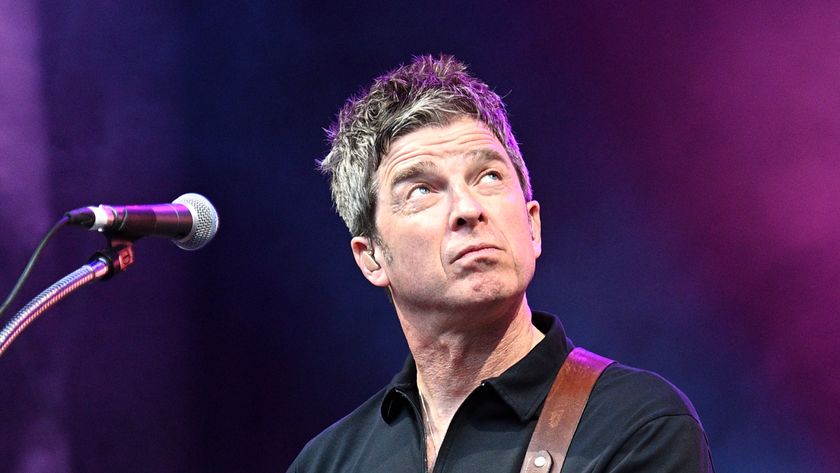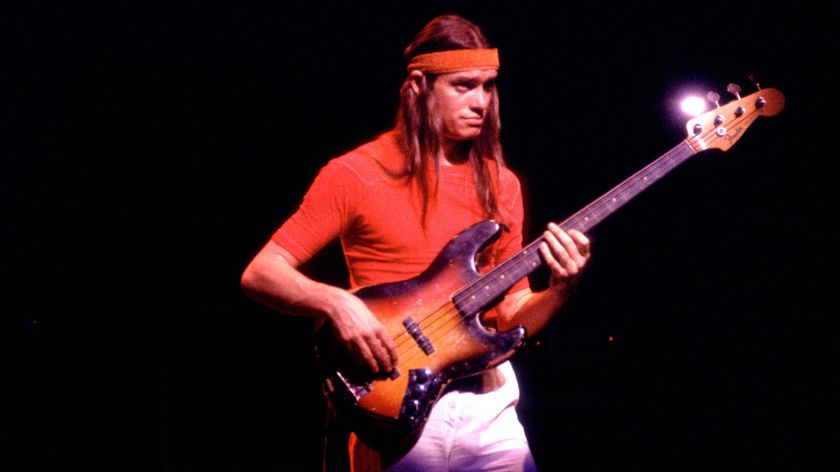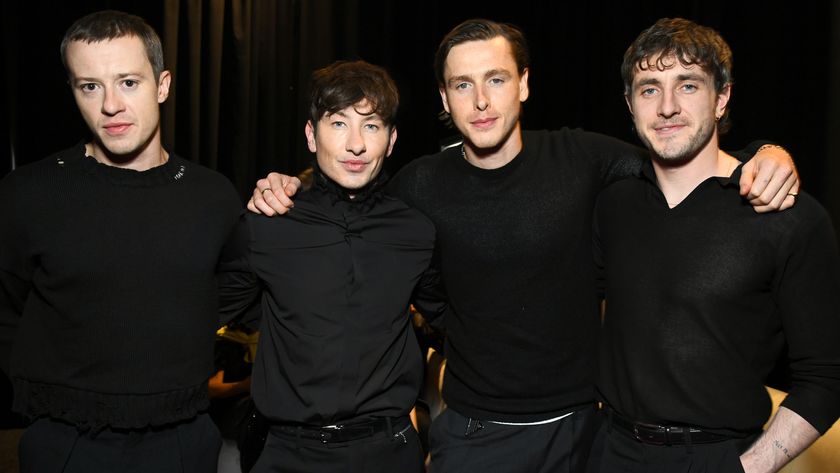Track-by-track: Rainbow Ffolly on their first album in 48 years, Ffollow Up!
Cult psychedelic popsters return
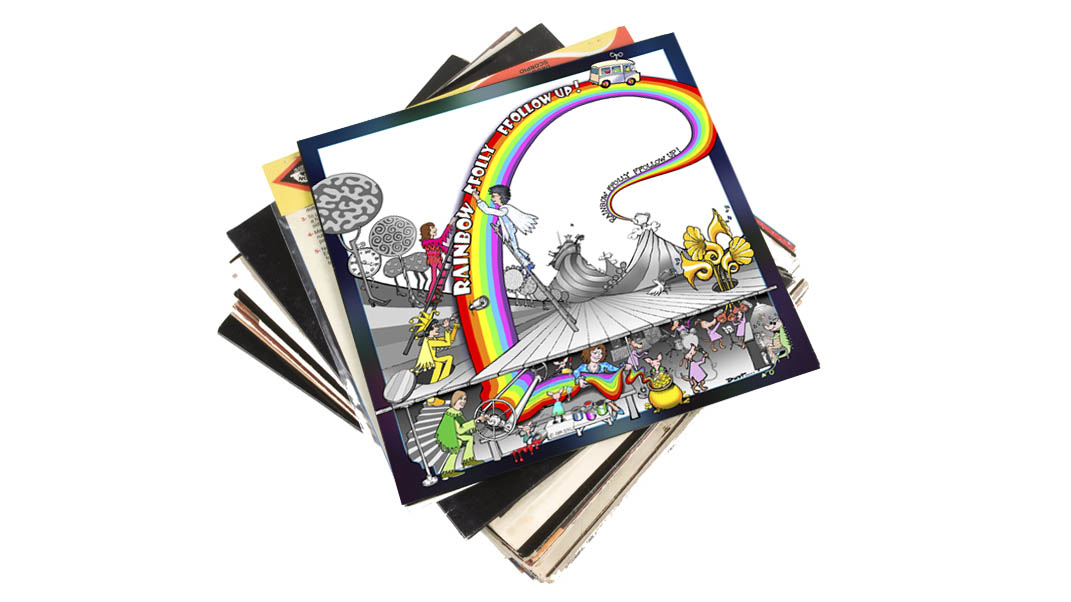
We've heard of long-delayed albums, but '60s psyche-pop outfit Rainbow Ffolly's second LP might just take the biscuit, as it arrives an incredible 48 years after their 1968 Parlophone debut, Sallies Fforth - a record-to-record gap only matched by US garage-rockers The Sonics.
Formed by brothers John and Richard Dunsterville, and completed by Roger Newell (bass) and Stewart Osborn (drums), Rainbow Ffolly were famed for their unpredictable pop songwriting craft, offbeat humour, and off-the-wall visuals - aided by the use of a clockwork ambulance as a touring vehicle, naturally.
The band split shortly after the release of their debut in 1968, which has since accrued cult status among '60s pop aficionados and vinyl junkies, resulting in a number of reissues over the years.
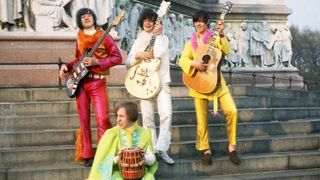
Ffolly in their late-'60s heyday
In the almost five decades between albums, John and Roger played with Rick Wakeman's English Rock Ensemble at the height of his mid-'70s be-caped powers, while Roger is currently one of rock 'n' roller Marty Wilde's Wildcats. Stewart, on the other hand, has a very different claim to fame, having worked on models for Gerry Anderson's TV series', includingThunderbirds, Captain Scarlet and Joe 90.
However, 2016 seemed like the right time to get the band back together (minus Richard, who now resides in Nevada), and with Ffollow Up!, the trio of John, Roger and Stewart have crafted a characteristically eclectic slice of pop that manages to encompass everything from blues to Latin and prog along its kaleidoscopic journey.
Here, Roger takes us through the 13 decade-spanning songs that make up Rainbow Ffolly's decade-defying return.
Get the MusicRadar Newsletter
Want all the hottest music and gear news, reviews, deals, features and more, direct to your inbox? Sign up here.
Ffollow Up! is available now via Footprints Vinyl Records.
Side one
1. Single Cell Amoeba (2015)
"Unashamed self-promotion using a (semi-) musical gag. It's a nod to our debut album, Sallies Fforth, which had a similar tendency and snatches of humour throughout. Apparently, we were the first band ever to release an album before a single, which is funny, too!"
2. Postcard (2014)
"This is the kind of musical soundscape that we always enjoy doing. It's about the need to rush to the aid of a distant love if she calls for help. If anyone can tell us what the airport announcer is saying, then please send in your answers on a postcard."
3. My Love Has Gone (1965)
"This was written way back - in fact, before I joined the band. It narrowly missed being on the first album, so we were determined to include it here. It's very typical of our onstage sound back in the '60s, featuring dominant 12-string guitar and block harmonies."
Apparently, we were the first band ever to release an album before a single!
4. White Swan (2016)
"In contrast, this is the most recent composition in this set. A curious tale of lost love in a dramatically changing world. It presented the perfect opportunity of using the bowed electric dulcimer to create nostalgic images alongside the beautiful and haunting sound of a flute."
5. Cars (1975)
"'70s Americana in the form of a road song, where we finally admit to being totally overwhelmed by the huge automobile machine. Written with an LA flavour during the time that John and I were endlessly travelling the world with Rick Wakeman."
6. Sky Angels (1976)
"This was written for the English Rock Ensemble just a year later, after the parting of the ways with Wakeman. It's an expansive prog-style anthem that again evokes the '70s feel with choral effects and heroic guitars over solid bass and drums. Another Ffolly soundscape."
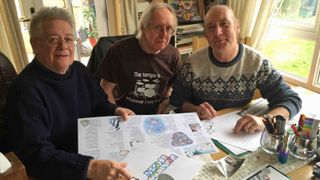
Rainbow Ffolly today, going over the final artwork for Ffollow Up!
Side two
7. Noah (1970)
"Again, this song uses the classic Ffolly sound for this ancient tale of God trying to convince Noah to build an ark. This song was also destined for the second album, and at last, it sees the light of day. Interestingly, the original arrangement has remained intact."
8. Slow Down Zone (2015)
"In spite of the sweet harmony set against a rising chorus, this is a warning to all clock-watchers. Enjoy each moment in life and make it last as long as possible. It was probably inspired by the relentless ticking of Stewart's clock."
9. Countdown (2014)
"Psychedelic rock with apocalyptic sci-fi-flavoured lyrics are set against stacked harmonies and guitar obligato. It's one of life's lessons to all: to think before you act whether it's today, tomorrow, or in the distant future."
Seems that little or nothing has changed over almost half a century. Daft as a back brush? Guilty as charged!
10. Shoes (1995)
"Every album needs a blues song, and this is ours. It's all about footwear fetishes and retail therapy played in a Mose Allison style. It's a warning to collect-aholics, and maybe even a cure?"
11. Is It Over (1977)
"This is another 'lost love' song - neat and concise, but fuelled with a surprising, and off-the-wall, guitar solo. One of those 'caught at the right moment' recordings that is overwhelmingly pleasing. Stewart was immediately taken with this song, and he's rarely wrong."
12. Tour de Fforce (2014)
"Essentially, this is an autobiographical story. What we did, where we went and what went wrong due to the rigours of the road. Let's hope our old manager John Sparrowhawk gets to hear this. He was part of that story, and some of the references in the arrangement are just for him."
13. Bathers Of The Lost Ark
"A revisit to the bathroom scene at the end of our first album, Sallies Fforth. Seems that little or nothing has changed over almost half a century. Daft as a back brush? Guilty as charged! Now, about that duck..."
Mike is Editor-in-Chief of GuitarWorld.com, in addition to being an offset fiend and recovering pedal addict. He has a master's degree in journalism, and has spent the past decade writing and editing for guitar publications including MusicRadar, Total Guitar and Guitarist, as well as a decade-and-a-half performing in bands of variable genre (and quality). In his free time, you'll find him making progressive instrumental rock under the nom de plume Maebe.

"Reggae is more freeform than the blues. But more important, reggae is for everyone": Bob Marley and the Wailers' Catch a Fire, track-by-track

“Part of a beautiful American tradition”: A music theory expert explains the country roots of Beyoncé’s Texas Hold ‘Em, and why it also owes a debt to the blues

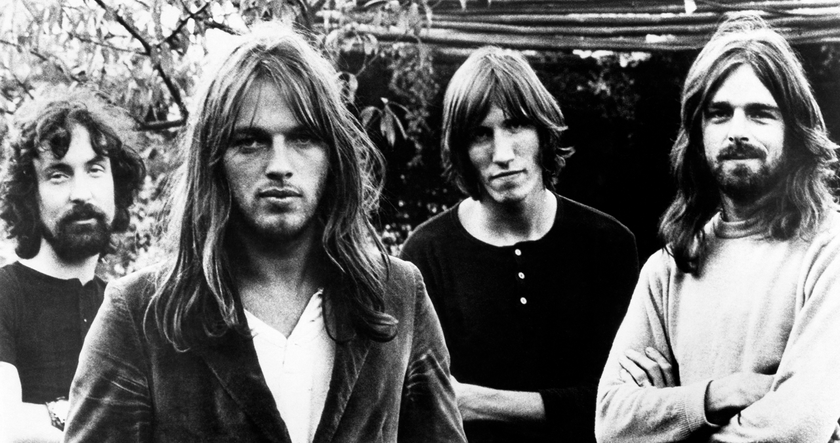


![Chris Hayes [left] wears a purple checked shirt and plays his 1957 Stratocaster in the studio; Michael J. Fox tears it up onstage as Marty McFly in the 1985 blockbuster Back To The Future.](https://cdn.mos.cms.futurecdn.net/nWZUSbFAwA6EqQdruLmXXh-840-80.jpg)
